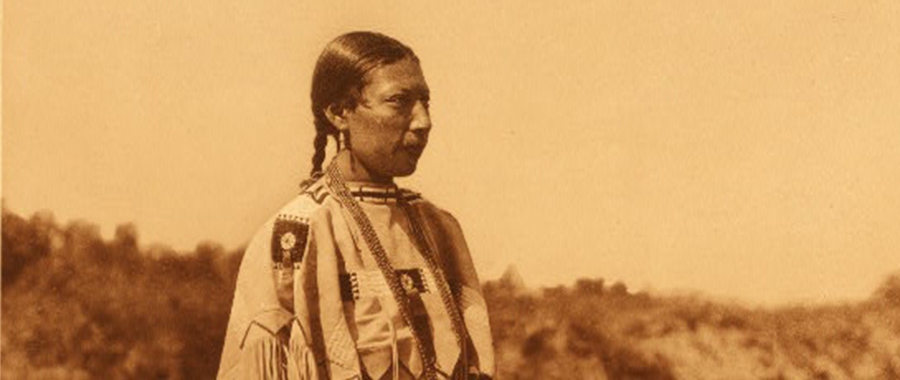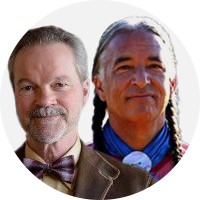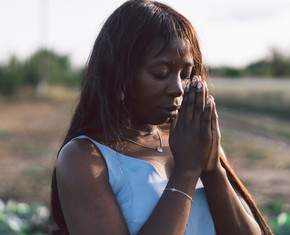The views expressed in our content reflect individual perspectives and do not represent the authoritative views of the Baha'i Faith.
To learn more about the indigenous Messengers of God in the Americas, BahaiTeachings.org continues Christopher Buck’s interview with Lakota Baha’i, Kevin Locke.
Q: Earlier, Kevin, we talked about the “Ten Commandments” of White Buffalo Calf Woman:
- Possess great respect and reverence toward sacred things.
- Live as belonging to one family.
- Be always very faithful to promises.
- Cease hostilities against other nations.
- Administer help to the sick.
- Comfort others in time of sorrow.
- Show kindness toward every living creature on Earth.
- Remember the dead.
- Love your children dearly.
- Above all, lead pure lives. – Frances Densmore, “Teton Sioux Music,” Bureau of American Ethnology Bulletin, Vol. 61 (1918), pp. 65–66.
First, to explain the origins of these spiritual teachers, and their teachings, let’s look at a passage from Baha’u’llah:
It is clear and evident to thee that all the Prophets are the Temples of the Cause of God, Who have appeared clothed in divers attire. If thou wilt observe with discriminating eyes, thou wilt behold them all abiding in the same tabernacle, soaring in the same heaven, seated upon the same throne, uttering the same speech, and proclaiming the same Faith. Such is the unity of those Essences of being, those Luminaries of infinite and immeasurable splendour. – Baha’u’llah, The Book of Certitude, pp. 153–154.
Kevin, do you agree that, if the teachings of all three of these Messengers of God compare favorably, then that’s good evidence that they were sent by the same “Great Spirit,” or “Great Being,” God? That White Buffalo Calf Woman, Deganawida, the Peacemaker, and Baha’u’llah “are the Temples of the Cause of God,” that all three Messengers of God “have appeared clothed in divers (diverse) attire,” are “abiding in the same tabernacle,” are “soaring in the same heaven,” are “seated upon the same throne,” are “uttering the same speech,” and are “proclaiming the same Faith”?
I myself have envisioned these three Messengers in conversation!
A: Of course, I would answer “Yes!” to all these questions. These are the exact same questions I asked myself 45 years ago, leading up to becoming a Baha’i.
I find it fascinating that you have envisioned these Messengers in conversation. According to the narratives I’ve heard, the Cheyenne Messenger of God—Sweet Medicine—attended a convocation of all the divine Messengers and was bade by the Chief of them all (Baha’u’llah?) to sit beside him and receive the message that he was to deliver to his people. A book called Sweet Medicine by Peter Powell is on my reading list. I wonder if this convocation is recounted there?
Q: These are among Sweet Medicine’s sacred laws and teachings, as told by Cheyenne tribal historian John Stands in Timber, and recorded by anthropologist Margot Liberty, a collaborative effort:
Many centuries ago the prophet and savior Sweet Medicine came to the prairie people. Before his birth the people were bad, living without law and killing one another. But with his life those things changed. Indians are often called savages, and it was true of the Cheyennes at first, but not after Sweet Medicine’s time. …
“Listen to me carefully, and truthfully follow up my instructions,” Sweet Medicine told the chiefs. “You chiefs are peace makers. Though your son might be killed in front of your tepee, you should take a peace pipe and smoke. Then you would be called an honest chief. You chiefs own the land and the people. If your men, your soldier societies, should be scared and retreat, you are not to step back but take a stand to protect your land and your people. Get out and talk to the people. If strangers come, you are the ones to give presents to them and invitations. When you meet someone, or he comes to your tepee asking for anything, give it to him. Never refuse. Go outside your tepee and sing your chief song, so all the people will know you have done something good.”
As closely as I can put it, that is what he told them. And the chiefs did keep it in their minds. When I was a boy they used to go up on a hill near camp and talk to the people about all the laws Sweet Medicine had taught so long ago. There were many of them. The Cheyennes were not supposed to marry too young or to anyone related to them; they have forgotten that today. They were not to take anything by force, from another person, or use it without permission, or to say bad things about others, especially the leaders or chiefs. They were to take pride in their bodies and the way they appeared, to keep clean and stay healthy. …
I learned the laws from my grandfather. – John Stands In Timber and Margot Liberty, Cheyenne Memories, pp. 27, 44–45.
Kevin, would you comment, please?
A: It is clear from the above testimony that Sweet Medicine adjured the people to rise above their earthly, materialistic tendencies and to set their sights on that which is heavenly and eternal—that is, to forego the ephemeral and transitory things of life. Surely this guidance is from a heavenly source. Sweet Medicine became the conduit for these blessings and guidance that would bring them into alignment with the will of Maheo (the Cheyenne word for God) and enable the Cheyenne peoples to prosper in this world and the worlds to come.
Early on, the Cheyenne and Lakota became the closest of allies and sealed their sacred bond through the exchange of prayer songs which are used today in remembrance of the Divine Beings—Sweet Medicine and White Buffalo Calf Woman, who rescued their peoples from starvation and degradation and promised the Day of light and unity that would bring them to all abundance and bounty.
Q: Thanks for introducing me to this divine messenger named Sweet Medicine, Kevin. As you know, I have a PhD in the academic study of religion—so that means that I’m supposed to know quite a bit about world religions. But I later realized that all of my graduate training—for which I am very grateful—taught me virtually nothing about indigenous religions in the Americas. That’s one reason why I thank you for expanding my consciousness.
I also taught world religions for several years as a university professor. One of the justifications for teaching world religions at state-funded institutions—without running afoul of First Amendment restrictions in the U.S. Constitution—is to promote what scholars call “spiritual literacy.” Do you agree that people in general, who are interested in religion—and Baha’is in particular—would do well to acquaint themselves with the indigenous messengers of God that we have so far presented, in furtherance of their own “spiritual literacy”?
A: When one studies the historical record, one finds that virtually all of early European chroniclers, including Columbus, testified to the moral superiority of the Indigenous people. From whence does that moral compass originate? What is the Source of all goodness? Morality? Spirituality? I believe that we are at the dawning edge of a collective spiritual coming of age when we can acknowledge and celebrate the stupendous heavenly heritage of this side of the planet.
















Comments
Sign in or create an account
Continue with Googleor